Meet the pioneering cancer researchers who are the recipients of this year’s Victoria’s Secret Global Fund grants.
Icons take many forms, and, since 2021, Victoria’s Secret, through our Global Fund for Women’s Cancers, in collaboration with Pelotonia and the American Association for Cancer Research, has been highlighting a very specific kind: female scientists who are at the forefront of research into women’s cancers. The VS Fund invests in the next generation of women scientists who are committed to improving outcomes for women’s cancers. Meet this year’s 10 awardees.
MYA ROBERSON

An assistant professor of health policy and management at the UNC Gillings School of Public Health and a member of the Lineberger Cancer Center, Mya Roberson, MSPH, PhD, leads research aimed at improving cancer outcomes for Black women. Roberson is doing that by focusing specifically on genetic testing, where there has been so much innovation particularly in the past 10 years. “Now more and more women are eligible to become genetically tested to help guide their treatment decisions, whether they should be treated with a double mastectomy or receive chemotherapy, and these genetic tests also have implications for women’s families,” says Roberson. Using a combination of patient surveys from black women who have received genetic testing to understand what enabled them to get tested and what the barriers were, plus health insurance data, Roberson’s goal is to better understand the best population-level treatment options for those with hereditary breast and ovarian cancers (HBOC). It’s a path she was first drawn to during her undergraduate years at Brown University. “I knew that I was interested in science, and that I enjoyed people and public health, and I was trying to reconcile how I could put those together,” she says. During a class on epidemiology, she was struck by a figure showing the breast cancer mortality rate’s changes over time, and specifically how the advances in survival had not been realized for all groups. “Black women and other women of color have not been as well served by the advances that we’ve made over the last 20 or 30 years, and I looked at that figure and, at 20-years-old, I said, ‘that’s what I want to devote my career to,’” she says.
MARTINA MCDERMOTT
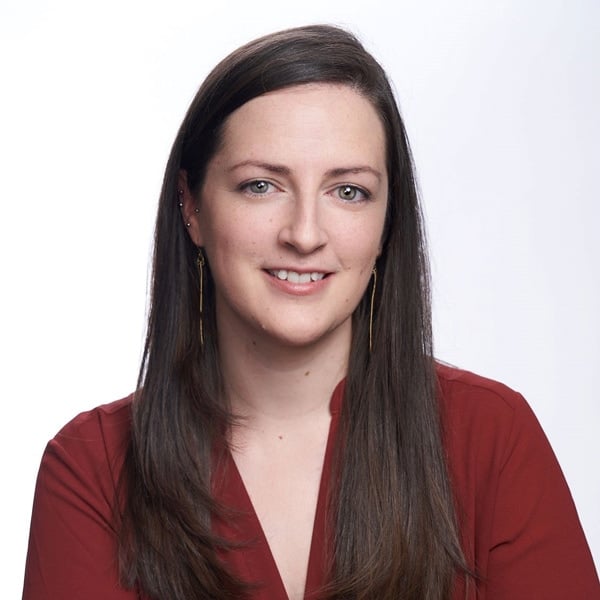
While there have been significant strides made in the development of treatments for breast cancer, the same progress hasn’t been made for ovarian and endometrial cancers. It’s a fact that drives the work of Martina McDermott, PhD, an adjunct assistant professor at UCLA who specializes in developing novel drugs for these cancers which typically have very bad outcomes. “A lot of that is driven by the fact that there are not a lot of selective therapies, therapies that can selectively kill cancer while sparing normal healthy cells,” says McDermott, adding that traditional chemotherapy-based treatments can kill cancer cells but also normal tissue too. While the path towards bringing a new drug to market can be a long and arduous one, says McDermott, she believes the Victoria’s Secret Global Fund will be critical in helping her reach her goal. “It will be instrumental in helping me not only gain valuable collaborations and mentorship with the community that’s been put together through this fund, but also the ability to perform the research, which until now has not been funded,” she says.
KEMI DOLL
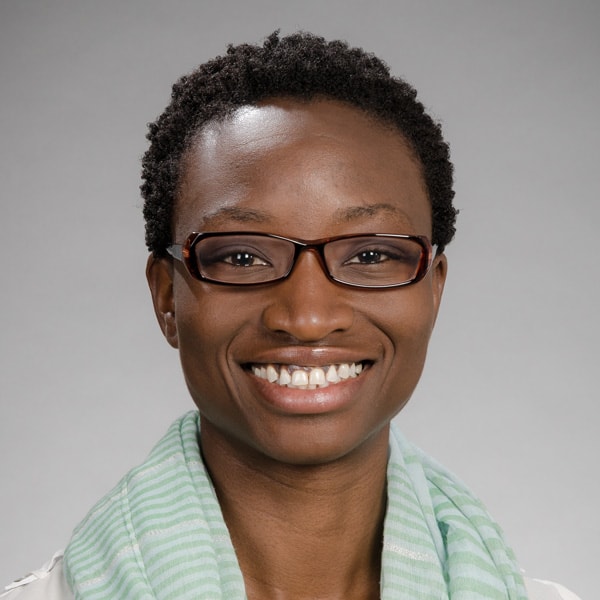
Kemi Doll, MD, MCSR, was already well into medical school on a path towards becoming an OB-GYN when she discovered gynecologic oncology. “I didn’t even realize it existed,” says Doll. But while Doll, who is an associate professor in the department of obstetrics and gynecology at the University of Washington, finds her work both incredibly rewarding and challenging, she wanted to have more than a one-on-one impact in terms of patient care and outcomes. The self-proclaimed research nerd was determined to, through investigation and asking lots of questions, figure out how to improve the care of gynecologic cancers for all women. Especially women of color. “My research works to eliminate the racial inequity that we have right now in endometrial cancer diagnosis, treatment and outcomes for Black women in the US,” says Doll. “What I want to do is make sure that being Black doesn’t mean that you’re consigned to having the worst outcomes.” And Doll thinks it’s critical that successful multinational brands like Victoria’s Secret voice their support of this work. “I deal with people who develop cancer in their most intimate parts, and there’s so much silencing and shame and stigma around these types of cancers,” says Doll. “This kind of partnership brings more resources and elevates gynecologic cancers to the platform they need to be on because they affect half the population on the earth.”
CHEMTAI MUNGO
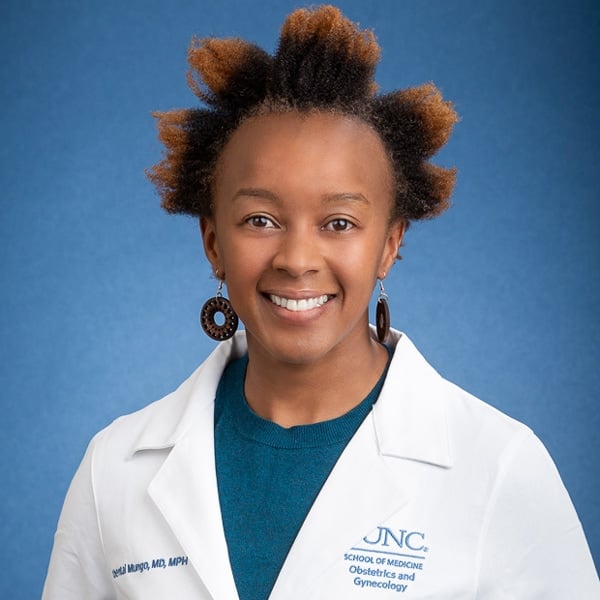
The population of women that Chemtai Mungo, MD, MPH, FACOG, an assistant professor of obstetrics and gynecology at the University of North Carolina at Chapel Hill, focuses her research on are women living with HIV in sub-Saharan Africa, where the burden of having cervical cancer is weighty. Something she understands well. “I was born and raised in Kenya in East Africa, and I witnessed the disproportionate burden that women faced from weak health systems, especially following a cancer diagnosis,” says Mungo. “The gynecology wards have many, many women with advanced cases of cervical cancer, who are often dying, very painful, very undignified deaths, because they lacked access to learn both primary and secondary prevention. Seeing the stark contrast between that and the US is really what drove me to this work.” Mungo is investigating whether self-administered fluorouracil (5-FU) can be a viable option for improving precancer treatment outcomes. Funding for her research is especially critical: 85% of all cervical cancer cases globally occur in low and middle-income countries and 90% of all women who die from the disease are living in low and middle-income settings. But, says Mungo, historically need hasn’t predicated where research money goes. Says Mungo: “If you look today, out of approximately 4,000 registered clinical trials specific to cervical cancer less than 3% are occurring in sub-Saharan Africa, even though these countries face the bulk of the disease.”
SANDRA MCALLISTER
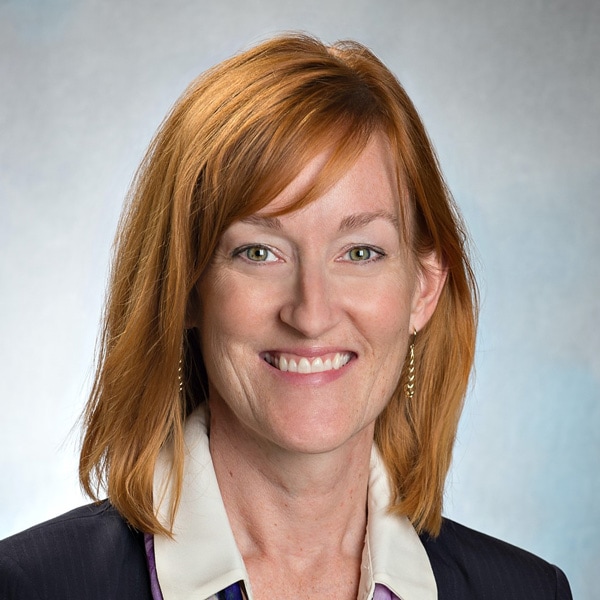
“What is it about the aging process and, in particular, how the aging immune system declines with age, that contributes to the risk of disease,” asks Sandra McAllister, PhD, an associate professor of medicine at Harvard Medical School and in the hematology division at Brigham & Women’s Hospital. It’s a question that propels her research. In certain populations, predominantly among non-Hispanic Black women, immune aging is occurring earlier than normal. “We’re asking questions about how premature aging may lead to those disparities and the outcomes that we see in those particular populations,” says McAllister, adding that consistent exposure to race-related stress can play a significant role. Investment in this type of research is crucially important, but so is investing in women researchers. “We’re seeing more women leave the field at higher rates than we have in the past,” says McAllister. “Victoria’s Secret investing in women, particularly at a critical time in our career, will incentivize and energize us to do the important work in fighting these women’s cancers.”
MARLEEN KOK
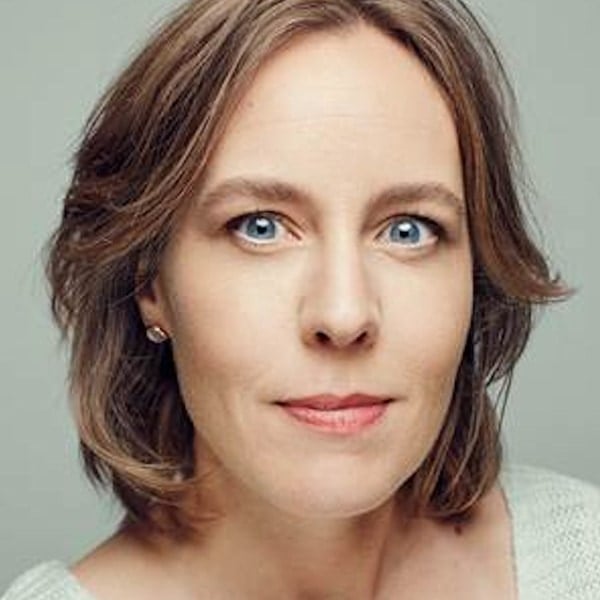
Marleen Kok, MD, PhD, a medical oncologist and associate professor in translational cancer research at the Netherlands Cancer Institute, admits that she wasn’t a big fan of medical school. “I was fascinated by cells and how cells behave, and by doing research to generate new knowledge, instead of applying existing knowledge,” says Kok. The new knowledge she’s busy generating nowadays relates to breast cancer immunotherapy and the immune systems of breast cancer patients. What gives Kok great hope is witnessing the instances of research benefitting individual patients. She recalls a clinical trial in 2015 when immunotherapy was used to treat patients with metastatic triple-negative breast cancer, a very difficult subtype. “We were treating patients and we didn’t know what to expect, but with all these patients where there was no hope, we saw a beautiful response,” says Kok. “As of today some of those women are still alive and they still come to me but now we talk about vacations and children, not about their disease anymore.”
VALENTINA HOYOS VELEZ
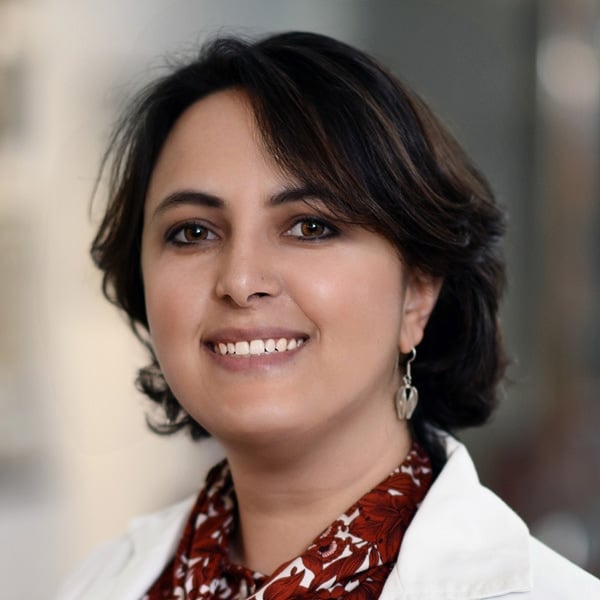
After her grandfather died of cancer, along with a number of patients while she was in medical school, Valentina Hoyos Velez, MD, decided to dedicate her career to working on treatments for it. An assistant professor specializing in breast oncology at Baylor College of Medicine, her research is focused specifically on T cell therapies and how they can be wielded against triple-negative breast cancer, which tends to be harder to treat, plus it grows faster and spreads more easily. “When I first learned about T cell therapies, I was blown away by the possibility that we could engineer the cells of our immune system to redirect them against cancer, and I knew that that would revolutionize its treatment,” says Hoyos Velez. “The work that I’m doing helps women’s own immune systems find and attack the cancer.”
JOYCE LIU
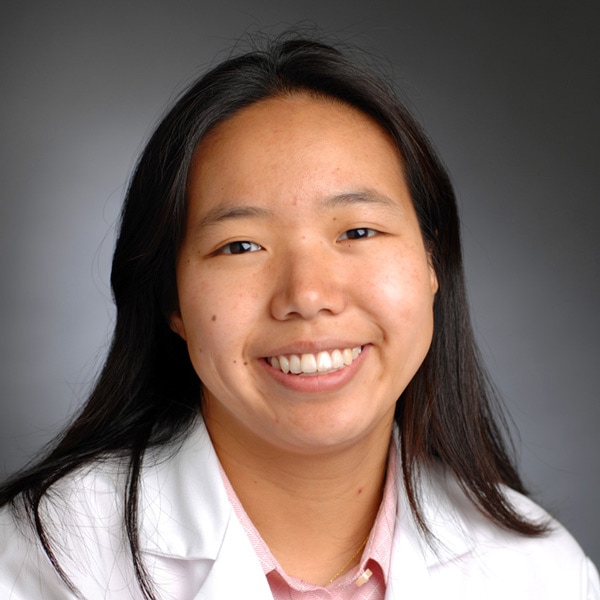
It’s high-grade endometrial cancer that Joyce Liu, MD, MPH, the associate chief and director of clinical research in the Division of Gynecologic Oncology at the Dana-Farber Cancer Institute, is focused on addressing with her research with support from our VS Global Fund grant. Endometrial cancer is marked by molecular alterations that suggest high intrinsic replication stress. Liu is in the midst of investigating whether two replication stress-targeting agents could bring a pioneering new therapy to women suffering with this form of cancer. “I am extremely humbled and grateful to be a recipient of this grant. With this support, I am excited to be able to advance our research into how combining two replication stress-targeting agents could bring an urgently needed new therapy to our patients with high-grade endometrial cancer.”
PRISCILLA BRASTIANOS
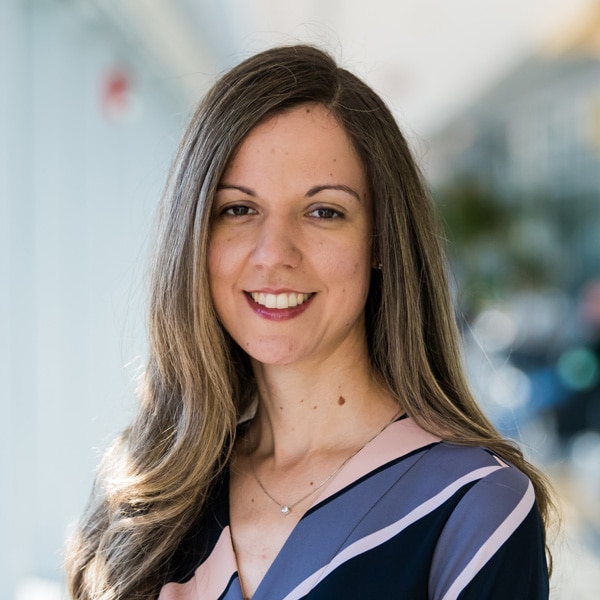
As Director of the Central Nervous System Metastasis Program at Boston’s Mass General Cancer Center, Priscilla Brastianos, MD, is intent with her research on identifying the drivers and, in turn, new therapies, of brain metastasis from breast cancer. While these central nervous system metastases occur all too frequently in breast cancer, there remains a limited understanding of why. Brastianos is determined to change that. “I am very grateful for this Victoria’s Secret Global Fund for Women’s Cancers Rising Innovator Research Grant, in Partnership with Pelotonia & AACR. Brain metastases remain an unmet need in oncology. With funding from this grant, we hope to make great strides at identifying better therapies for patients with this devastating disease.”
SHUANG ZHANG
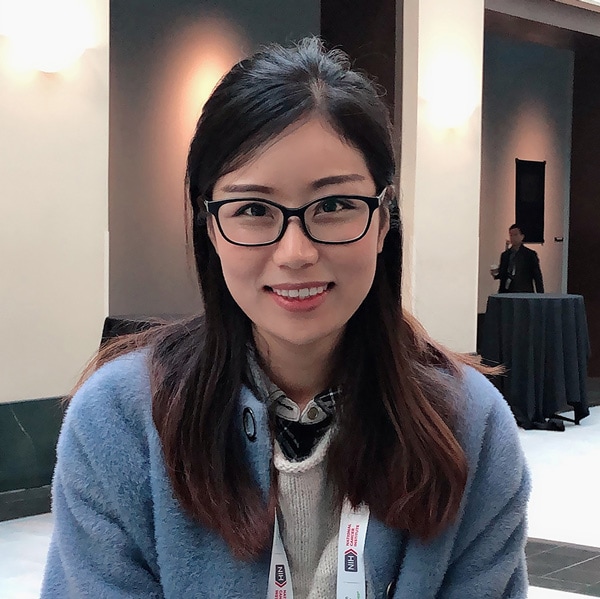
After earning a doctoral degree in reproductive biology, Shuang Zhang, PhD, now an assistant professor at Guangzhou Medical University in China, is wielding human genomics to come up with a precision therapy to treat high-grade serous ovarian cancer (HGSC). The most common type of ovarian cancer is also the most devastating, recognized for its aggressiveness, high rate of metastasis, its resistance to traditional therapies, and its frequent recurrence. Which is what makes Zhang’s research that much more urgent. “Getting this grant has definitely invigorated me – a validation that my focus on high-grade serous ovarian cancer research is meaningful. I’m so honored to have this opportunity to work with Victoria’s Secret to improve outcomes of ovarian cancer patients around the world.”
